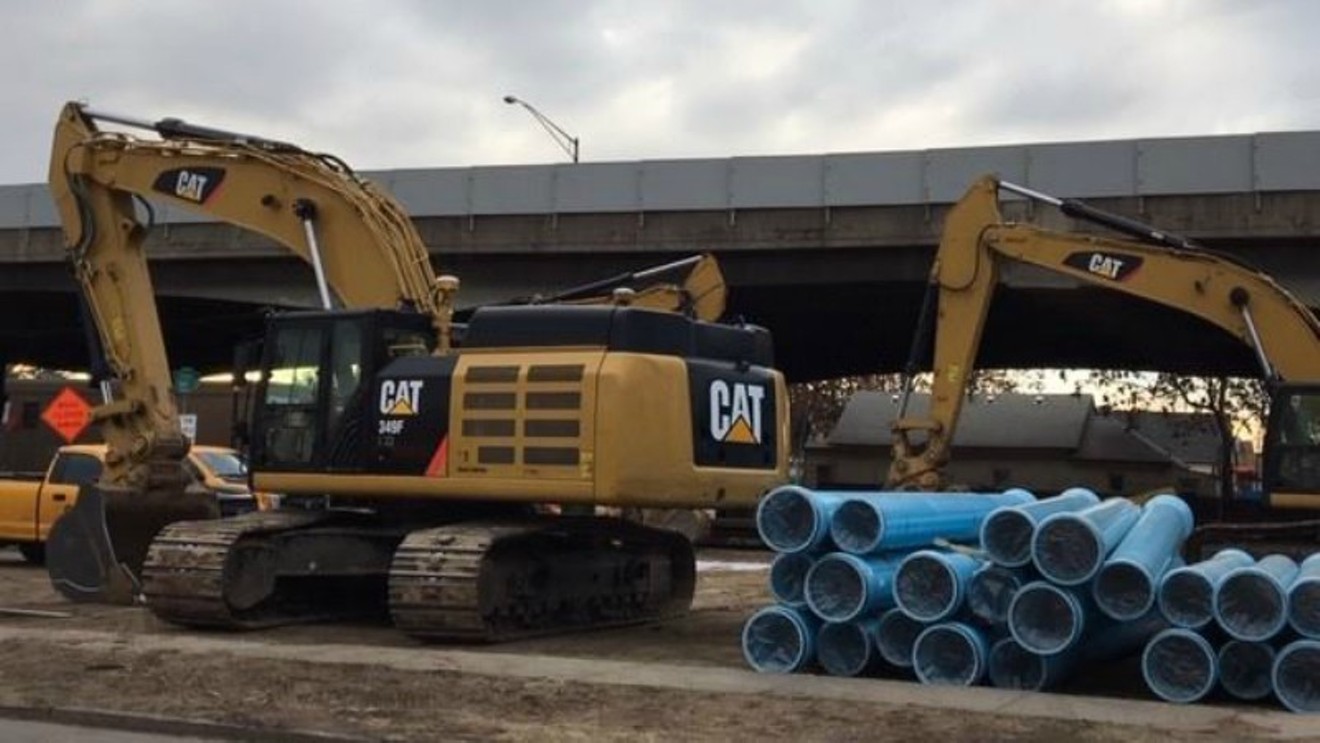In August 2018, the Colorado Department of Transportation broke ground on Central 70, a massive five-year (at minimum) project intended to reimagine and revitalize a stretch of Interstate 70 through Denver — and construction on the I-270 flyover to eastbound I-70 will result in a large stretch of the highway being closed at 10 p.m. tonight and staying that way for the entire weekend.
The timing of this temporary shutdown is noteworthy, given that it follows in the wake of a new national report that rips Central 70 and argues that rather than expanding the existing roadway, CDOT should tear the whole thing down.
Given that Central 70 construction has been under way for months, for good or ill (those complaining about a York ramp closure causing unprecedented neighborhood traffic nightmares would undoubtedly opt for the latter descriptor), shifting such massive gears wouldn't seem to be an option at this point. But Ben Crowther, a transportation fellow with the Washington, D.C.-based nonprofit Congress for the New Urbanism and overseer of the organization's 2019 "Freeways Without Futures" study that included I-70, emphasizes that "it's never too late to stop a highway project."
Indeed, Crowther reveals, "I have tracked 37 different examples of highway projects that were being built through urban environments that strong community opposition eventually halted." These findings are compiled in a separate CNU offering, "Never Too Late to Stop the Bulldozer."
This history cheers Brad Evans, the man behind the Denver Cruisers bike rides and a founder of Ditch the Ditch, which he characterizes as "a loosely assembled group of people who have been opposed to this project." In his words, "We've had a governor change-up and we might have a mayor change-up in Denver. And those two things could be good for rethinking this disaster."
In the meantime, CDOT is moving ahead with Central 70, and Region 1 communications manager Stacia Sellers dismisses the overarching idea touted by Crowther, Evans and Unite North Metro Denver, another organization that reviles the project, which consists of replacing the interstate with a boulevard and directing the freeway around neighborhoods through which it currently slices.
According to Sellers, corresponding via email, "The concept of entirely moving a section of interstate that serves hundreds of thousands of commuters and freight vehicles every day is not a reasonable alternative nor is it one that would benefit local communities."
The objections in the CNU report to I-70 as currently situated are primarily environmental, with a focus on the health and welfare of those living near the route through the Mile High City. "Highways are known sources of pollution," the document states. "Air quality decreases significantly for residents who live within 1,000 feet of a highway. Yet in Denver’s Elyria, Swansea, and Globeville neighborhoods, CDOT is about to undertake an expansion of I-70 that threatens to displace 5 percent of the neighborhood’s population and bring even more of its residents into the 1,000-foot pollution threshold, where vehicle emissions cause increased rates of asthma, heart attack, stroke, lung cancer and pre-term birth."
Given these factors, Unite North Metro Denver "proposed an alternative in place of the elevated highway," the report goes on. "A tree-lined boulevard, with roundabouts instead of interchanges, would re-establish the community grid, free up land for development and raise property values."
Here's a United North Metro Denver video that illustrates this vision:
Instead of embracing this notion, CDOT is moving ahead with Central 70, and in order to do so, the report points out, "the state must seize and demolish 56 residences and seventeen businesses, including one of the few groceries in the area. The plan also includes the demolition of Swansea Elementary School’s playground, and the school building itself would be directly adjacent to the fourteen-lane highway."
The aforementioned playground won't be gone for good, Crowther concedes. "CDOT says, 'We're relocating the playground.' But it's still next to a highway. Their approach is, 'We're providing the amenities.' But it's not the amenities. It's the location next to the highway."
A number of lawsuits were filed to stop Central 70, with the last of them being resolved this past December, when CDOT "agreed to contribute $550,000 to an independent health study that will provide a greater understanding of public health and environmental hazards in the Globeville, Elyria and Swansea neighborhoods," the report points out. But the doc also argues that the plan, which was first proposed in 2004, "runs contrary to recent transportation developments in Colorado" and the policies of new governor Jared Polis, "who campaigned on the dual issues of cutting vehicle emissions and increased mass transit."
A spokesperson for Polis declined to comment on the section of "Freeways Without Futures" devoted to I-70 because "we have not had the chance to review the findings of the report." But Crowther believes the Central 70 project is "the antithesis" of the governor's environmental stance, and also sees it as contradicting the will of voters, who last year rejected two transportation measures, propositions 109 and 110.
"Departments of transportation are very much involved in their own metrics — and that involves creating a level of service for automobiles," Crowther says. "That's more or less what they evaluate when they build highways: How many automobiles can we accommodate on that road, and will it possibly solve traffic congestion? A success for them is creating more service for automobiles, but that's not necessarily a success for commuters and consumers. Highways take up a lot of land where a tax base is lost, [they require] infrastructural upkeep and [they are] a problem from the social aspect. No one wants to live around a highway. It's loud and polluting, and it keeps people from walking on foot and encountering their own neighborhoods. All these tangible social aspects are destroyed by plowing a highway through this environment."
Replacing I-70 with a boulevard through the Central 70 construction zone would require rerouting the interstate onto two other highways, Interstate 270 and Interstate 76, which are generally placed in commercial and industrial areas as opposed to actual neighborhoods. But CDOT considers the concept to be a terrible idea, as laid out in a fact sheet created to counter those proposing it. Spokesperson Sellers estimates that such a move would cost $3.2 billion (CNU puts the Central 70 price tag at $1.2 billion) and maintains that "a reroute would result in significant traffic increases to the local street network and the construction of a major six-lane boulevard through Elyria and Swansea that would need to serve some of the region's largest freight distribution centers."
Sellers denies that the department has disregarded the impact Central 70 will have on those living nearby, stressing that the CDOT has "committed to providing interior storm windows and air-conditioning units, plus financial assistance for utility costs, to residents between 45th and 47th avenues and Brighton to Colorado boulevards to help mitigate dust and noise during construction... . CDOT is also ensuring job opportunities for residents through a 20 percent local (geographic-based) hiring requirement as a part of its contract with Kiewit," its corporate partner in the project. "CDOT is committed to providing on-the-job training to provide opportunities for workers to advance to high-skill positions during the construction period. The skills developed through this training will last a lifetime and opens the door for future opportunities."
The 150 or so community commitments made by CDOT in connection with Central 70 "are without precedent in Colorado, never having been provided as part of a major infrastructure project," Sellers allows. "After nearly fourteen years of studying this corridor, CDOT feels confident that this project will deliver a product that will be highly beneficial to the State of Colorado and have mitigated many community concerns. A boulevard does not meet current or future demands and does not align with the project's purpose and needs."
Sheer momentum is undeniably on CDOT's side. But Ditch the Ditch's Evans doesn't think the ongoing construction makes a pivot impossible. "Look at Jane Jacobs," he says. "She was the one who fought the Lower Manhattan Expressway in New York City." That roadway was originally proposed in 1958 and, he goes on, "was already under construction when they decided to kill it."
"Jane Jacobs and a number of community activists stopped the Lower Manhattan Expressway in its tracks at the eleventh hour and the 59th minute," Crowther confirms. "And another example is the former Park East Freeway in Milwaukee. The project, started in 1971, was opposed by the community during construction and only built for a length of 0.8 miles. It was eventually removed under the leadership of Mayor John Norquist and is one of the sixteen completed or planned urban highway removals in the United States."
Crowther mentions a local precedent, too — the Jefferson Parkway, a toll road that Golden Mayor Jacob Smith described in a 2009 Westword interview as a "weird, disconnected road to nowhere." In the face of objections from officials in Golden and other communities, CDOT eventually walked away from the plan.
Of course, Central 70 is much further along than was the Jefferson Parkway, making a course reversal that much more difficult, as Ditch the Ditch's Evans acknowledges. "Maybe this report won't stop the project — a billion-dollar project run by crony capitalists and lobbyists. But it may help with what happens next, since they've been talking about widening and tolling I-25 and 270, too."
And Crowther? "I won't say there's a decent chance" that a popular uprising could squelch Central 70, "but I'm hopefully optimistic. Because it would be better for everyone."
[
{
"name": "Air - MediumRectangle - Inline Content - Mobile Display Size",
"component": "12017618",
"insertPoint": "2",
"requiredCountToDisplay": "2"
},{
"name": "Editor Picks",
"component": "17242653",
"insertPoint": "4",
"requiredCountToDisplay": "1"
},{
"name": "Inline Links",
"component": "18838239",
"insertPoint": "8th",
"startingPoint": 8,
"requiredCountToDisplay": "7",
"maxInsertions": 25
},{
"name": "Air - MediumRectangle - Combo - Inline Content",
"component": "17261320",
"insertPoint": "8th",
"startingPoint": 8,
"requiredCountToDisplay": "7",
"maxInsertions": 25
},{
"name": "Inline Links",
"component": "18838239",
"insertPoint": "8th",
"startingPoint": 12,
"requiredCountToDisplay": "11",
"maxInsertions": 25
},{
"name": "Air - Leaderboard Tower - Combo - Inline Content",
"component": "17261321",
"insertPoint": "8th",
"startingPoint": 12,
"requiredCountToDisplay": "11",
"maxInsertions": 25
}
]













